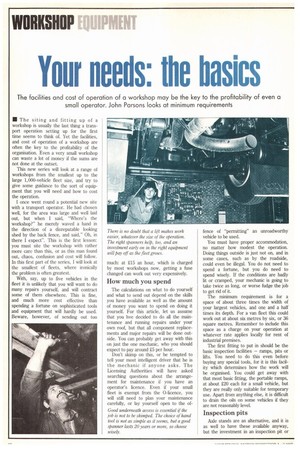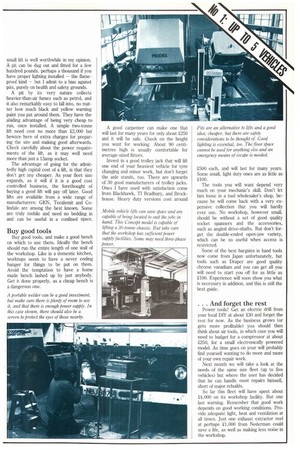Your needs: the basics
Page 86

Page 87

If you've noticed an error in this article please click here to report it so we can fix it.
The facilities and cost of operation of a workshop may be the key to the profitability of even small operator. John Parsons looks at minimum requirements
• The siting and fitting up of a workshop is usually the last thing a transport operation setting up for the first time seems to think of. Yet the facilities, and cost of operation of a workshop are often the key to the profitability of the organisation. Even a very small workshop can waste a lot of money if the sums are not done at the outset.
This new series will look at a range of workshops from the smallest up to the large 1,000-vehicle fleet size, and try to give some guidance to the sort of equipment that you will need and how to cost the operation.
once went round a potential new site with a transport operator. He had chosen well, for the area was large and well laid out, but when I said, "Where's the workshop?" he merely waved a hand in the direction of a disreputable looking shed by the back fence, and said," Oh, in there I expect". This is the first lesson: you must site the workshop with rather more care than this, or as this man found out, chaos, confusion and cost will follow. In this first part of the series, I will look at the smallest of fleets, where ironically the problem is often greatest.
With, say, up to five vehicles in the fleet it is unlikely that you will want to do many repairs yourself, and will contract some of them elsewhere. This is fine, and much more cost effective than spending a fortune on sophisticated tools and equipment that will hardly be used. Beware, however, of sending out too much: at 215 an hour, which is charged by most workshops now, getting a fuse changed can work out very expensively.
How much you spend
The calculations on what to do yourself arid what to send out depend on the skills you have available as well as the amount of money you want to spend on doing it yourself. For this article, let us assume that you hve decided to do all the maintenance and running repairs under your own roof, but that all component replacements and major repairs will be done outside. You can probably get away with this on just the one mechanic, who you should expect to pay around 25 per hour.
Don't skimp on this, or be tempted to tell your most intelligent driver that he is the mechanic if anyone asks. The Licensing Authorities will have asked searching questions about the arrangement for maintenance if you have an operator's licence. Even if your small fleet is exempt from the 0-licence, you will still need to plan your maintenance carefully, or lay yourself open to the of
Good underneath access is essential if the job is not to be skimped. The choice of hand tool is not as simple as it seems, but a good spanner lasts 20 years or more, so choose wisely.
fence of "permitting" an unroadworthy vehicle to be used.
You must have proper accommodation, no matter how modest the operation. Doing things outside is just not on, and in some cases, such as by the roadside, could even be illegal. You do not need to spend a fortune, but you do need to spend wisely. If the conditions are badly lit or cramped, your mechanic is going to take twice as long, or worse fudge the job to get rid of it.
The minimum requirement is for a space of about three times the width of your largest vehicles, and one and a half times its depth. For a van fleet this could work out at about six metres by six, or 36 square metres. Remember to include this space as a charge on your operation at whatever rate applies locally for rent of industrial premises.
The first fitting to put in should be the basic inspection facilities — ramps, pits or lifts. You need to do this even before buying any special tools, for it is this facility which determines how the work will be organised. You could get away with that most basic fitting, the portable ramps, at about 220 each for a small vehicle, but they are really only suitable for temporary use. Apart from anything else, it is difficult to drain the oils on some vehicles if they are not reasonably level.
Inspection pits
Axle stands are an alternative, and it is as well to have these available anyway, but the investment in an inspection pit or small lift is well worthwhile in my opinion. A pit can be dug out and fitted for a few hundred pounds, perhaps a thousand if you have proper lighting installed — the flameproof kind — but I admit to a bias against pits, purely on health and safety grounds.
A pit by its very nature collects heavier-than-air fumes such as petrol, and it also remarkably easy to fall into, no matter how much black and yellow warning paint you put around them. They have the abiding advantage of being very cheap to run, once installed. A simple two-tonne lift need cost no more than £2,000 but beware here of extra charges for preparing the site and making good afterwards. Check carefully about the power requirements of the lift, as it may well need more than just a 13amp socket.
The advantage of going for the admittedly high capital cost of a lift, is that they don't get any cheaper. As your fleet size expands, as it will if it is a good cost controlled business, the forethought of buying a good lift will pay off later. Good lifts are available from a wide range of manufacturers: Glf..N, Tecalemit and Colindale are among the best known. Some are truly mobile and need no bedding in and can be useful in a confined space.
Buy good tools
Buy good tools, and make a good bench on which to use them. Ideally the bench should run the entire Length of one wall of the workshop. Like a domestic kitchen, worktops seem to have a never ending hunger for things to be put on them. Avoid the temptation to have a home made bench lashed up by just anybody. Get it done properly, as a cheap bench is a dangerous one. A good carpenter can make one that will last for many years for only about 250 and it will be safe. Check on the height you want for working. About 90 centimetres high is usually comfortable for average-sized fitters.
Invest in a good trolley jack that will lift one end of your heaviest vehicle for tyre changing and minor work, but don't forget the axle stands, too. There are upwards of 30 good manufacturers of trolley jacks. Ones I have used with satisfaction come from Blackhawk, TI Bradbury, and Brockhouse. Heavy duty versions cost around 2500 each, and will last for many years. Some small, light duty ones are as little as 2100.
The tools you will want depend very much on your mechanic's skill. Don't let him loose in a tool wholesaler's shop, because he will come back with a very expensive collection that you will hardly ever use. No workshop, however small, should be without a set of good quality socket spanners and the accessories, such as angled drive-shafts. But don't forget the double-ended open-jaw variety, which can be so useful when access is restricted.
Some of the best bargains in hand tools now come from Japan unfortunately, but tools such as Draper are good quality chrome vanadium and you can get all you will need to start you off for as little as 2100. Experience will soon show you what is necessary in addition, and this is still the best guide.
. . . And forget the rest
Power tools? Get an electric drill from your local DIY at about .E.30 and forget the rest for now. As the business grows (or gets more profitable) you should then think about air tools, in which case you will need to budget for a compressor at about .2250, for a small electronically powered model. As time goes on your will probably find yourself wanting to do more and more of your own repair work.
Next month we will take a. look at the needs of the same size fleet (up to five vehicles) but where the user has decided that he can handle most repairs himself, short of major rebuilds.
So far this fleet will have spent about £4,000 on its workshop facility. But one last warning. Remember that good work depends on good working conditions. Provide adequate light, heat and ventilation at all times. Just one exhaust extractor reel at perhaps 21,000 from Nederman could save a life, as well as making less noise in the workshop.
















































































































